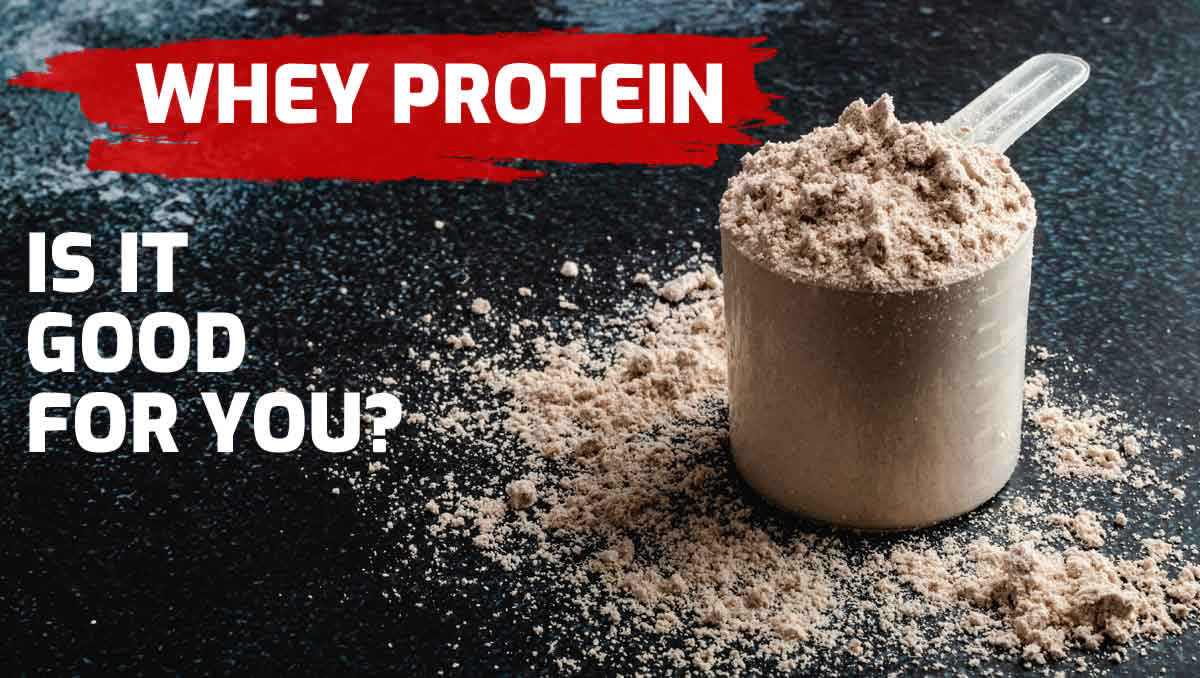Is Whey Protein Powder Good For You?

Whey protein power is a popular dietary supplement, but there is some debate about whether it is truly beneficial. Proponents of protein whey powder claim that it can help build muscle, reduce recovery time after exercise, and even promote weight loss.
Protein is an essential macronutrient for the human body. It helps to build and repair muscle tissue, it is necessary for growth during childhood and adolescence, and it helps to regulate hormones and enzymes. Most people can get the protein they need from a variety of animal and plant sources. However, some people may need to supplement their diet with protein powder or other protein-rich foods.
Active people, including athletes, need more protein than sedentary people. The amount of protein required depends on the intensity and duration of the activity. For example, endurance athletes may need 1.2 to 1.4 grams of protein per kilogram of body weight per day.
Protein needs also increase during periods of growth, such as childhood, adolescence, and pregnancy. In general, adults need about 0.4 to 0.5 grams of protein per pound (0.9 to 1.1 grams per kilogram) of body weight.
Benefits Of Taking Whey Protein Powder
There are many benefits of whey protein. It is a complete protein, meaning it contains all the essential amino acids that our bodies need. It is also low in lactose and easy to digest. Whey protein is a great source of energy and helps to build and repair muscle tissue. It can also help to reduce body fat and increase lean muscle mass.
Whey protein is a great way to get all the essential amino acids our bodies need. It is also low in lactose and easy to digest. Whey protein is a great source of energy and helps to build and repair muscle tissue.
In order to get all the essential amino acids you need for muscle growth and recovery, you need to eat enough protein. Amino acids are the building blocks of protein. There are 20 different amino acids that our bodies need. Nine of these amino acids are essential, meaning they cannot be produced by our bodies and must be obtained through our diet. Whey protein contains all nine of the essential amino acids, making it a complete protein.
Whey protein is also low in lactose. Lactose is a type of sugar found in milk and dairy products. Some people have trouble digesting lactose, which can cause gas, bloating, and diarrhea. Whey protein is easier to digest than other types of protein, making it a good choice for people with lactose intolerance.
Whey protein is a great source of energy. It is digested and absorbed quickly, which makes it ideal for post-workout recovery. Whey protein helps to build and repair muscle tissue. It can also help to reduce body fat and increase lean muscle mass. Whey protein is available in powder form or as a supplement. It can be mixed with water or milk and taken before or after exercise. It can also be added to smoothies, shakes, and other recipes. The recommended daily intake of protein is 0.36 grams per pound of body weight. For example, a person who weighs 150 pounds would need 54 grams of protein per day. The amount of protein you need may be different depending on your age, activity level, and muscle mass.
Protein powders are a convenient way to increase your protein intake. They are easy to mix and can be taken with you on the go. Whey protein powder is a good choice for people who are looking to build muscle or lose weight. There are many different brands and types of whey protein powder. Some are made with all-natural ingredients, while others may contain added sugars, flavors, or colors. Be sure to read the label carefully to choose a protein powder that fits your needs.
Whey protein is a healthy, convenient way to increase your protein intake. It has many benefits, including building muscle, reducing body fat, and increasing energy. Choose a protein powder that fits your needs and lifestyle to get the most benefit from it.
What Is Whey Protein?
Whey protein is a milk protein that is isolated from whey, the liquid by-product of cheese production. It is a complete protein, meaning it contains all of the essential amino acids that your body needs to build muscle. Whey protein is an extremely popular supplement among bodybuilders and athletes because it is an easy and convenient way to consume high-quality protein.
In addition to its muscle-building benefits, whey protein has also been shown to boost immunity, reduce inflammation, and promote weight loss. If you are looking for a convenient and effective way to increase your protein intake, whey protein is an excellent option. Whether you are a bodybuilder, athlete, or simply trying to improve your health, whey protein can help you reach your goals.
There are three main types of whey protein: whey concentrate, whey isolate, and whey hydrolysate.
Whey concentrate is the most common and cheapest form of whey protein. It contains around 80% protein and is lower in fat and lactose than other forms of whey protein. Whey isolate is a purer form of whey protein that contains around 90% protein. It is also lower in lactose and fat, but more expensive than whey concentrate. Whey hydrolysate is the most expensive form of whey protein and contains around 98% protein. It is pre-digested, meaning it is easier for your body to absorb and use.
Whey Protein Powder For High Cholesterol
Higher cholesterol builds up in blood vessels, which can lead to a heart attack or stroke. However, it is possible to prevent this from happening with a healthy lifestyle and regular exercise. Eating a diet high in fiber and whey protein can help lower total and LDL cholesterol. This can also help lower blood pressure and improve endothelial function, which is essential for artery elasticity.
While it is important to note that whey protein is predigested, its high nutritional value makes it an excellent choice for people with high cholesterol levels. It has been linked to reduced blood pressure and weight loss. Furthermore, whey protein is thought to stimulate the production of glutathione, the body's main antioxidant. Despite its potential benefits, however, whey protein should only be taken as a supplement after consulting a medical professional if you are suffering from high cholesterol.
Why Should You Take Whey Protein?
Whey protein is one of the most popular sports supplements on the market. There are many reasons why someone might take whey protein. Here are a few of the most common reasons:
1. Whey protein is an excellent source of protein. Protein is essential for muscle growth and repair. Whey protein is a particularly good source of protein because it is easy to digest and contains all of the essential amino acids your body needs.
2. Whey protein can help you build muscle mass. If you are looking to build muscle mass, whey protein can be an effective supplement. When combined with resistance training, whey protein can help you build muscle mass and strength.
3. Whey protein can help you lose weight. If you are trying to lose weight, whey protein can be a helpful tool. Whey protein helps you feel fuller after eating, which can lead to reduced calorie intake and weight loss. Protein whey powder will not cause you to gain weight. However, if you combine it with exercise, it will speed up the fat-burning process. If you want to lose weight, make sure you're eating enough calories to fuel your body's growth. This way, you can make your protein powder shakes more effective without gaining extra weight or fat.
4. Whey protein can improve athletic performance. Whey protein can help athletes improve their performance. It can help increase muscle mass and strength, as well as improve recovery from exercise.
5. Whey protein is convenient. Whey protein is a convenient way to get protein into your diet. It is easy to find and comes in a variety of flavors. Whey protein powder can be mixed with water or milk and taken anywhere.
6. Whey protein is rich in BCAAs. Whey protein is an excellent source of branched-chain amino acids (BCAAs), which are essential for muscle growth and recovery. BCAAs are broken down more slowly than other amino acids, so they can be used by your muscles for longer. This makes whey protein ideal for post-workout recovery.
7. Whey protein can improve your immune system. Whey protein is also rich in glutamine, an amino acid that helps boost immune function and aids in wound healing. Glutamine is also important for gut health, and whey protein can help increase levels of this amino acid.
If you are looking to improve your athletic performance, whey protein can help you build muscle and recover from workouts more quickly. If you are trying to lose weight, whey protein can help you feel fuller after meals and promote fat loss. And if you are simply looking to improve your health, whey protein is a good source of essential amino acids and can help you maintain a healthy weight.

